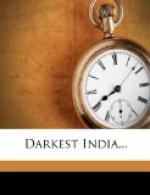3. Again, it is not an indiscriminate system of largely extended charity that we propose to provide. Our object is to find work for these workless multitudes, and such work as shall more than pay for the very humble pittance the Indian destitute requires. He must be a poor specimen of a human being who cannot fairly earn his anna or two annas a day, and our brains must be poor addled affairs, if in this great vast world of ours we cannot find that amount of work for him to do. It is all nonsense to talk about over-population, when the world is three parts empty and waiting to be occupied.
4. While we are piercing the bowels of the earth in search of gold, minerals and coal, there lies at our very door a mine of wealth which it is simple folly for us to ignore. True, the shaft has become choked with the rubbish of despair, vice and crime, which will take time, trouble and untiring patience to dig through. But it needs no prophet to foresee that beneath this rubbish are veins of golden ore which will amply repay our utmost efforts to open up. The old adage that “labour is wealth,” and that a nation’s riches consist in its hardy sons and daughters of toil, will yet be proved true. Treat this human muck-heap even as you would ordinary sewage or manure, and who does not know that the very same putrefying mass of corruption which if allowed to remain near our doors would breed nothing but fever, cholera, and the worst forms of disease and death, when removed to a little distance, will double and treble the ordinary fertility of the soil and produce crops that will increase the wealth of the entire nation?
And knowing this can we be so blind, even to our selfish interests, as to treat this human waste in a manner that we should deem the very height of imprudence and folly in dealing with the other sort? Can we shut our eyes to the fact that there are moral diseases, more terrible in their nature, and more fatal to a nation’s life, than the bodily ones, against which we are so anxious to guard, even at the most lavish expenditure of the public purse? And shall we, in dealing with this moral sewage, neglect even the most ordinary precautions that we consider necessary in dealing with the conservancy of our cities?
If on the other hand the problem be boldly and wisely faced, I am convinced that in India, as in England, General Booth’s most sanguine prophecies will be realised, our most pestilential marshes shall be drained, our moral atmosphere purified, prosperity take the place of destitution, and hope that of despair. The millstone that hangs around our national neck, so that we can barely keep our heads above water, even when there is not a ripple upon its surface, and that always threatens to engulf us in perdition at the first symptoms of a storm,—this millstone shall be converted into an unsinkable life-buoy, that shall not only support itself upon the crest of the highest waves, but shall help to keep afloat the entire national body. What is now an eyesore shall become an adornment, and what is now a cause of weakness shall be a source of strength, bulwark of protection and mine of wealth to all India. How this can be done we have sought in the following pages to unfold, adhering carefully to the programme marked out by General Booth, and suggesting only such additions and alterations as the circumstances of the case appear to necessitate.




